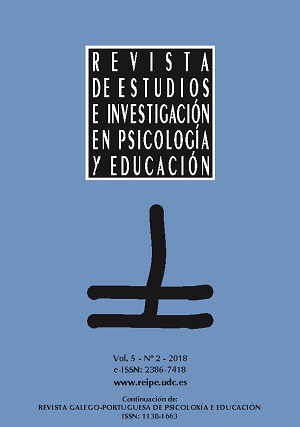Análise confirmatória da escala comportamental para crianças do Pré-Escolar (PKBSpt): versão portuguesa || Confirmatory analysis of behavior scale for children in preschool (PKBSpt): Portuguese version
Contido principal do artigo
Resumo
Palavras-chave:
Downloads
Detalles do artigo
Referências
Awmleh, A. A., & Woll, A., (2013). Reliability of the german language version of the preschool and kindergarten behavior scales second edition. Journal of Social Sciences, 9(2), 54-58. https://doi.org/10.3844/jssp.2013.54.58
Byrne, B. M. (2010). Structural equation modeling with Amos: Basic concepts, applications, and programming (2nd ed.). New York, NY: Taylor and Francis Group.
Campbell, S. B. (1995). Behaviour problems in preschool children: A review of recent research. Journal of Child Psychology and Psychiatry, 36(1), 113-149. https://doi.org/10.1111/j.1469-7610.1995.tb01657.x
Carney, A. G, & Merrell, K. W. (2002). Reliability and comparability of a spanish-language form of the preschool and kindergarten behavior scales. Psychology in the Schools, 39(4), 367-373. https://doi.org/10.1002/pits.10033
Corapci, F. (2008). The role of child temperament on Head Start preschoolers' social competence in the context of cumulative risk. Journal of Applied Developmental Psychology, 29, 1-16. https://doi.org/10.1016/j.appdev.2007.10.003
Diamantopoulos, A., & Siguaw, J. A. (2006). Formative Versus Reflective Indicators in Organizational Measure Development: A Comparison and Empirical Illustration. British Journal of Management, 17, 263-282. https://doi.org/10.1111/j.1467-8551.2006.00500.x
Dias, T. P., Freitas, L. C., Del Prette, Z. A. P., & Del Prette, A. (2011). Validação da escala de comportamentos sociais de pré escolares para o Brasil. Psicologia em Estudo (Maringá), 16 (3), 447-457. https://doi.org/10.1590/S1413-73722011000300012
Fazlıoğlu, Y., Okyay, L., & Ilgaz, G. (2011). Study validity and reliability to preschool and kindergarten behavior scales-PKBS-2. Trakya Üniversitesi Sosyal Bilimler Dergisi, 13 (1), 255-268. http://dergipark.gov.tr/trakyasobed/issue/30221/326295
Fernández, M., Benítez, J. L., Pichardo, M. C., Fernández, E., Justicia, F., García, T., García-Berbén, A., Justicia, A., & Alba, G. (2010). Análisis factorial confirmatorio de las subescalas del PKBS-2 para la evaluación de las habilidades sociales y los problemas de conducta en educación infantil. Electronic Journal of Research in Educational Psychology, 8(3), 1229-1252. http://www.redalyc.org/html/2931/293122000014/
Flanagan, D. P., Primavera, L. H., Povall, L., Higgins, D., & Alfonso. V. C. (1996). Convergent validity of the BASC and SSRS: Implications for social skills assessment. Psychology in the Schools, 33, 13-23. https://doi.org/10.1002/(SICI)1520-6807(199601)33:1<13::AID-PITS2>3.0.CO;2-X
Gomes, R. (2012). (Re)configuração das práticas educativas na prevenção do stresse na infância (Tese de Doutoramento não publicada, Universidade de Aveiro, Aveiro- Portugal). http://hdl.handle.net/10773/12707
Gomes, R. (2017). (Re)pensar as práticas educativas: a prevenção do stress na infância. Mauritius: Novas Edições Acadêmicas.
Gomes, R., & Pereira, A. (2014). Escalas comportamentais para crianças em idade Pré-Escolar, PKBSpt: manual. UA Editora: Universidade de Aveiro. Aveiro.
Gomes, R., Pereira, A., & Merrell, K. (2009). Avaliação Sócio Emocional: Estudo exploratório do PKBS-2 de Merrell aplicado a crianças portuguesas em idade Pré-Escolar. In Bento D Silva, Leandro S. Almeida, Alfonso Barca, & Manuel Peralbo (Orgs.). Actas do X Congresso Internacional Galego-Português de Psicopedagogia (pp. 2759-2767). Braga: Universidade do Minho. http://www.educacion.udc.es/grupos/gipdae/documentos/congreso/xcongreso/pdfs/t7/t7c202.pdf
Gomes, R., Pereira, A., Abrantes, N., Inocencio, L., Merrell, K., & Andreucci, L. (2011). Avaliação das aptidões sociais e comportamentais de crianças em idade pré-escolar: estudo comparativo entre Portugal, Brasil e Cabo Verde. In C. S. Reis & F. S. Neves (Coords.), Livro de Atas do XI Congresso da Sociedade Portuguesa de Ciências da Educação (Vol. 1, pp. 155-160). Guarda: Instituto Politécnico da Guarda. http://www.ipg.pt/11congresso-spce/atas_SPCE2011_volume1.pdf
González-Peña, P., Carrasco, M., Barrio, V. & Gordillo, R. (2013). Análisis de la agresión reactiva y proactiva en niños de 2 a 6 años. Revista Iberoamericana de Diagnóstico y Evaluación Psicológica, 35, 139-159. https://dialnet.unirioja.es/servlet/articulo?codigo=5064303
Greenfield, D. B., Iruka, I. U., & Munis, P. (2004). Assessment of Social Competence in High-Risk Preschoolers: Evaluation of the Adaptive Social Behavior Inventory (ASBI) across Home and School Settings. Journal of Psychoeducational Assessment, 22(3), 220-232. https://doi.org/10.1177/073428290402200303
Gresham, F. M., & Elliot, S. N. (1990). Social Skills Rating System: Manual. Circle Pines, MN: American.
Kelloway, E. K. (1998). Using LISREL for structural equation modeling: A researcher's guide. Thousand Oaks: Sage Publications.
Major, S., & Seabra-Santos, M. J. (2014). Validação Fatorial da Versão Portuguesa da Escala de Aptidões Sociais das Preschool and Kindergarten Behavior Scales. Paidéia (Ribeirão Preto), 24(58), 145-154. https://doi.org/10.1590/1982-43272458201402
Martorell, C., Gonzalez, R., Ordoñez, A., & Gomez, O. (2011). Estudio confirmatorio del cuestionario de conducta antisocial (CCA) y su relación con variables de personalidad y conducta antisocial. Revista Iberoamericana de Diagnóstico y Evaluación Psicológica, 31, 97-114. http://www.redalyc.org/articulo.oa?id=459645439006
Matson, J. L., & Wilkins, J. (2009). Psychometric testing methods for children’s social skills. Research in Developmental Disabilities, 30, 249–274. https://doi.org/10.1016/j.ridd.2008.04.002
McCabe, P. & Altamura, M. (2011). Empirically valid strategies to improve social and emotional competence of preschool children. Psychology in the Schools, 48(5), 513-540. https://doi.org/10.1002/pits.20570
Merrell, K. W. (1996). Social-Emotional assessment in early childhood: the preschool and kindergarten behaviour scales. Journal of Early Intervention, 20(2), 132-145. https://doi.org/10.1177/105381519602000205
Merrell, K. W. (2002). Preschool and Kindergarten Behavior Scales. Second Edition. Austin. TX: PRO-ED.
Moreira, J. M. (2004). Questionários: Teoria e prática. Coimbra: Almedina.
Muñoz, J, Martínez, M., Berbén, T., Cabezas, M.; Justicia, F., & Haro E. (2011). Análisis de la estructura factorial de las puntuaciones de la «Preschool and Kindergarten Behavior Scale» en población española. Psicothema, 23(2), 314-321. http://www.psicothema.com/psicothema.asp?id=3888
Pedersen, J. A., Worrell, F. C., & French, J. L. (2001). Reliability of the Social Skills Rating System with rural Appalachian children from homes with low incomes. Journal of Psychoeducational Assessment, 19, 45–53. https://doi.org/10.1177/073428290101900103
Seabra-Santos, M. J., & Gaspar, M. F. F. (2012). Pais, educadores e testes: estão de acordo na avaliação de aptidões de crianças pré-escolares?. Psicologia: Reflexão e Crítica, 25 (2), 203-211. https://doi.org/10.1590/S0102-79722012000200001
Shokri, A., Khosravi, A. A., & Hooman, H. A. (2013). Basic Psychometric Properties of the Preschool and Kindergarten Behavior Scales in a Sample of İranian Children. Procedia - Social and Behavioral Sciences, 84, 479-485. https://doi.org/10.1016/j.sbspro.2013.06.588
Taylor, G. J., Bagby, R. M., & Parker, J. D. A. (2003). The Twenty. Item Toronto Alexithymia Scale IV. Reliability and factorial validity in diferent languages and cultures. Journal of Psichosomatic Research, 55, 277-283. https://doi.org/10.1016/S0022-3999(02)00601-3



